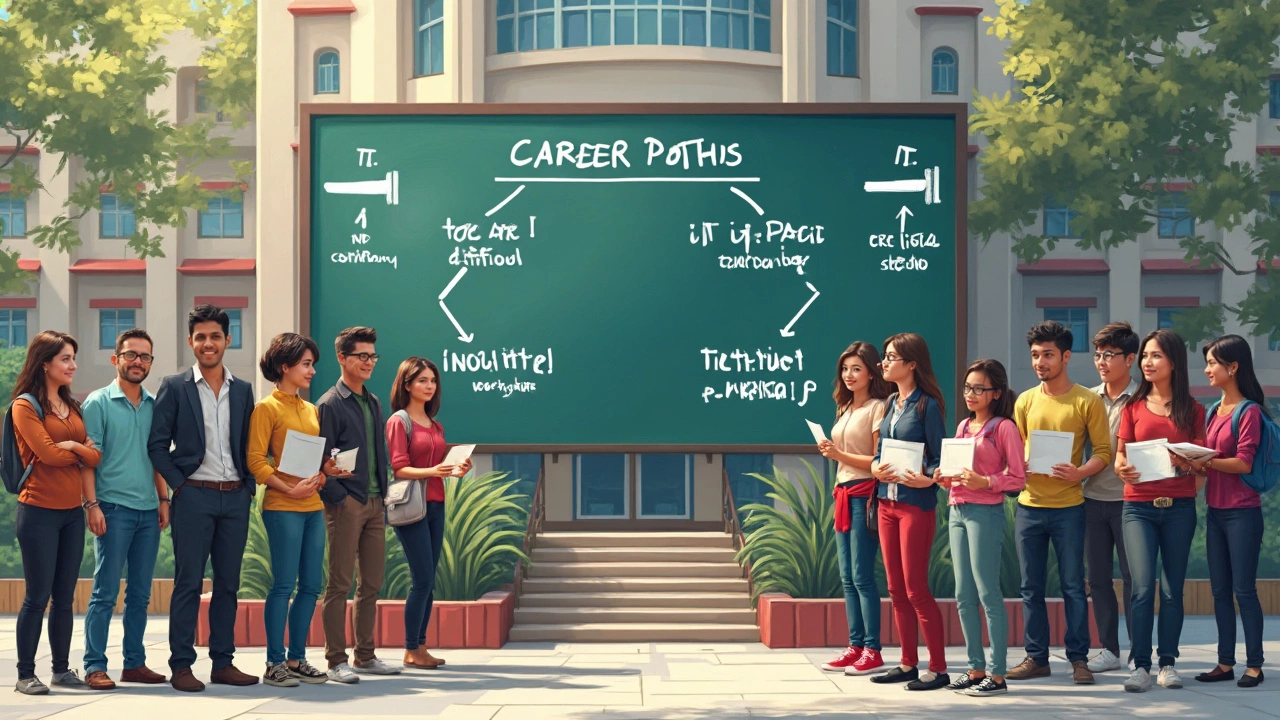Diploma or Degree: Which Is Better in India for Your Career?

If you're stuck between picking a diploma or degree in India, trust me, you aren't alone. The number of students and parents scratching their heads over this choice is massive. This isn't just about what your friends pick or what family elders say. This decision actually shapes your life for years. Everyone tells you 'degrees matter,' but then you see people with diplomas getting jobs quickly and skipping a pile of student debt.
Here’s the thing: both diplomas and degrees have their place. It’s not a one-size-fits-all kind of deal. Think about what you want from your education — fast entry into a job, steady career growth later, or just the prestige of a certain college tag. Each path leans into these differently. Don't just go along with the crowd; get the facts, weigh your situation, and pick what really works for your plan (and your family’s wallet).
Before diving into forms and counseling sessions, it’s a smart move to get a clear view of what these courses actually mean, how employers look at them, and what daily realities you're signing up for. No more guesswork. Let’s break it down, step by step, with some real talk and tips that stick.
- What’s the Difference Between a Diploma and a Degree?
- Career Scope: How Employers See Each Option
- Money, Time, and Flexibility: The Practical Side
- Real Stories: Success with Diplomas and Degrees
- Making the Right Choice for Your Goals
What’s the Difference Between a Diploma and a Degree?
If you’re confused about what separates a diploma from a degree in India, you’re not the only one. On the surface, both are official education qualifications, but they’re worlds apart in what they mean for your career route, how much time they take, and what you do in the classroom.
A diploma course in India is usually short and focused. Think 1 to 3 years after 10th or 12th standard. These programs dive deep into practical knowledge and skills in a specific area: hotel management, graphic design, nursing, or even an IT field like hardware networking. They’re often run by polytechnic institutes, private institutes, and sometimes state education boards. The main goal? Get you job-ready without frills. You spend more time in labs or actual fieldwork than in long lectures.
Degree courses are a longer journey. Bachelor’s degrees (like B.A., B.Com., B.Sc., or B.Tech) usually stretch 3 to 4 years and cover both theory and practicals, but with a lot more depth. Degree programs are offered by universities or colleges affiliated with universities and follow strict guidelines set by UGC or AICTE. The curriculum not only gives you skills for a job but also opens doors for higher studies — postgrad, research, and even exams like UPSC or CAT.
- Admission Requirements: Diplomas can start right after 10th in some streams, while degrees usually need 12th with subjects that match your course.
- Recognition: Degrees carry more weight for government jobs and further education. Diplomas are recognized, but may limit your future options in specific careers.
- Focus: Diplomas are about skill; degrees mix skill plus theory, critical thinking, and sometimes research.
Here’s a super clear snapshot:
| Feature | Diploma | Degree |
|---|---|---|
| Duration | 1–3 years | 3–4+ years |
| Eligibility | Usually 10th/12th | Usually 12th |
| Focus | Skill/practical | Theory + Skill |
| Job Options | Quick job entry in field | Wider variety, more senior |
| Further Study | Limited (lateral entry possible) | Open (postgrad, research) |
So, picking between a diploma vs degree really comes down to whether you want job-ready skills fast, or you’re after a “full package” education with options to go further later. There’s no ‘right’ answer — but now you can see the difference without getting lost in academic jargon.
Career Scope: How Employers See Each Option
Okay, so what do employers in India really care about when they see a diploma versus a degree on your resume? Let’s not sugarcoat it—different fields see them very differently. In most government jobs and at big IT companies, a degree is still the gold standard. It’s expected for roles in engineering, banking, research, and mainstream management jobs. Companies often set a degree as the minimum bar just to sort through thousands of applications quickly.
But—and this part most people underestimate—a diploma can actually get you into the workforce faster. Many private companies, especially in hands-on industries like hospitality, animation, design, automobile engineering, and IT support, don’t mind hiring diploma holders. What matters to them is your skill and ability to hit the ground running—not just your stamp from a university. In fact, a 2023 job survey by TeamLease found that over 45% of hiring managers in the skill-based sectors consider diploma holders equally or more relevant than degree holders for entry-level jobs.
Here’s a snapshot of how each is valued in the job market:
| Sector | Preference | Why? |
|---|---|---|
| IT/Software (Big MNCs) | Degree | Policy requires it, especially for roles like software development. |
| Animation / Graphic Design | Diploma | Skills, portfolio matter more than degree. |
| Banking/Government | Degree | Entry exams require a graduation degree for most posts. |
| Hotel Management | Diploma | Practical training is highly valued; faster job entry. |
| Engineering Core (like civil/mech) | Degree | Required for higher positions; diploma for junior-level. |
Another thing: big brands and government sectors usually offer better growth and higher pay to degree holders over time. But if you want to earn early, maybe support family or just get job-ready quickly, diploma courses in India can be the smarter ticket. Don’t forget, plenty of people start with a diploma, then go for a degree later when they are financially stable. It’s all about what fits your situation right now.

Money, Time, and Flexibility: The Practical Side
When it comes to picking between a diploma and a degree in India, most students (and their parents) have money and time at the top of their list of worries. Here’s what you need to know before betting your savings or years of your life.
Diploma courses in India are usually much cheaper than degrees. Fees for a standard two or three-year diploma at a good government polytechnic might cost you around ₹20,000 to ₹50,000 a year. Private institutes can be more expensive, but still often less pricey than a regular degree. On the other hand, a typical three-year degree can set you back anywhere from ₹30,000 in a government college to ₹2 lakhs or more per year at private colleges and universities.
| Course Type | Typical Duration | Average Annual Fees |
|---|---|---|
| Diploma | 1 to 3 years | ₹20,000–₹80,000 |
| Degree | 3 to 4+ years | ₹30,000–₹2,00,000+ |
Time is the next big thing. With diplomas, you’re out in the job market much sooner—think one to three years, while most degrees take at least three, and sometimes up to five, especially in fields like engineering or medicine. This early finish means you could start earning two or even three years before your classmates who chose degrees.
The cool thing about a diploma course in India is its flexibility. You can go for a part-time diploma or even pick up short-term certifications alongside a job, which is a lifesaver if you need to support your family or want real-world work experience. Most degree courses are full-time, and skipping classes or working part-time isn’t always easy.
Here’s a real-life quote I found helpful—straight from the head of HR at a major IT company (Times of India, 2023):
“We hire diploma holders for technical roles and see them climb up if they show real skill. The shorter course means they’re ready sooner and bring practical experience.”
If you’re worried about unpredictable family situations or changing plans, diplomas rarely tie you down as long as degrees do. In many cases, you can transfer credits from a diploma to a degree later, so you aren’t stuck if you change your mind.
To sum up this bit—if you want to save money, finish fast, and keep your options open, diploma courses India are tough to beat. But remember, a degree still carries more weight for certain jobs and long-term promotions. Pick what fits your life, not just what everyone says is better.
Real Stories: Success with Diplomas and Degrees
It’s easy to get caught up in arguments about what’s “better” on paper, but nothing hits harder than actual stories of real people. Across India, you’ll find both diploma holders and degree grads killing it in their fields. Here are some eye-openers that might make your decision a bit easier.
Let’s talk about Rohan, for example. He finished school in Mumbai and straightaway took up a diploma course in mechanical engineering at a top polytechnic college. Within two years, he landed a technician’s job at a manufacturing plant—earning more than some friends who chose to do full BTech. Rohan says he liked the hands-on training and that it helped him "hit the ground running" as soon as he was hired. A 2023 report by the All India Council for Technical Education (AICTE) showed that over 60% of diploma holders in technical fields are placed within six months of graduating. That's not a small number!
On the flip side, there’s Sneha from Chennai, who went for a BCom degree. She admits it took longer—three years—but it opened doors for higher studies abroad and cushier white-collar jobs. Sneha now works in an audit firm and feels that her degree is the ticket for promotions and long-term growth. According to data from Naukri.com, degree holders typically start slower, but after five years, they report higher average salaries than most diploma holders in the same industry.
Here’s what Dr. Anil Sahasrabudhe, former chairman of AICTE, had to say:
"Hands-on skills from diploma courses can help students get jobs faster, but a degree can provide better growth opportunities down the road. The right choice depends entirely on the individual’s goals and situation."
To give you a quick comparison based on real stats, check out this table:
| Course | Placement Rate (6 Months) | Average Starting Salary |
|---|---|---|
| Diploma (Technical) | 60% | ₹2.6 lakh/year |
| Degree (Engineering/Commerce) | 45% | ₹3.5 lakh/year |
Some tech giants in India, like Tata Motors, hire diploma holders straight from campus, but for jobs in IT, finance, or research, employers usually expect a degree at minimum.
The big takeaway here? Both paths have shining examples, but they suit different kinds of people. If you want to start earning quickly, a diploma course in India can get you in the game fast. If you’re thinking about growing into senior positions, teaching, or even working overseas, a degree is usually the safer bet.

Making the Right Choice for Your Goals
Don’t just pick between a diploma or degree because everyone else is doing it. Start by thinking about where you want to be three years down the line. Want a job super quick? Most diploma courses in India can put you on the market in a year or two. That’s why you see polytechnic grads working while degree holders are still chasing internships. But if you’re dreaming of careers like engineering, medicine, or law, most big employers want to see a degree on your CV.
Here’s something many miss: Your family budget and your ability to commit time matters more than you think. A diploma is usually lighter on the pocket, with many government polytechnic institutes keeping fees below ₹15,000 per year, while private degrees can easily demand five times that amount. Also, if you’ve got folks depending on you or a side hustle that needs time, a diploma gives you breathing space.
A 2023 Naukri.com report showed that nearly 60% of diploma holders in technical fields found jobs within six months of completing their course. Degree holders had a higher starting pay, but diploma holders jumped into the workforce sooner, sometimes gaining useful experience before their degree counterparts even finished college.
Here’s a simple way to figure things out—ask yourself:
- Is fast entry into a job my priority?
- Am I planning to study further, like post-graduation or an MBA?
- How much can I spend, really?
- Does my dream job require specific licenses or registration? (Think engineering, medical, teaching.)
- Am I open to learning on the job, or do I want more classroom time?
Speaking to people who’ve already taken the route you’re considering helps a lot. Don’t trust flyers or ads—ask real folks about placements, salaries, and work culture. My friend from Mumbai, for example, breezed through a hotel management diploma and started earning in two years, while his cousin slogged it out for a B.Com, only to end up in pretty much the same entry-level job.
"Forget what you think you should choose. Check the latest industry demands and remember, what worked five years ago might not work now." – Prof. Rajiv Singh, Career Advisor, Delhi University
If you want to compare, here’s a quick snapshot:
| Feature | Diploma | Degree |
|---|---|---|
| Course Length | 1-3 years | 3-5 years |
| Cost (Average Per Year) | ₹10,000-35,000 | ₹50,000-2,00,000 |
| Job Readiness | Faster | Slower, but roles may be broader |
| Upgradability | Limited | Easy to pursue masters, MBA etc. |
| Recognition Abroad | Sometimes limited | Generally better |
At the end, deciding between a diploma vs degree in India is about your reality, not someone else’s checklist. Get honest about your daily needs, job dreams, and capacity. This is your path, not a one-size-fits-all story. Use what’s out there and shape it for what actually fits you.

Post-Comment